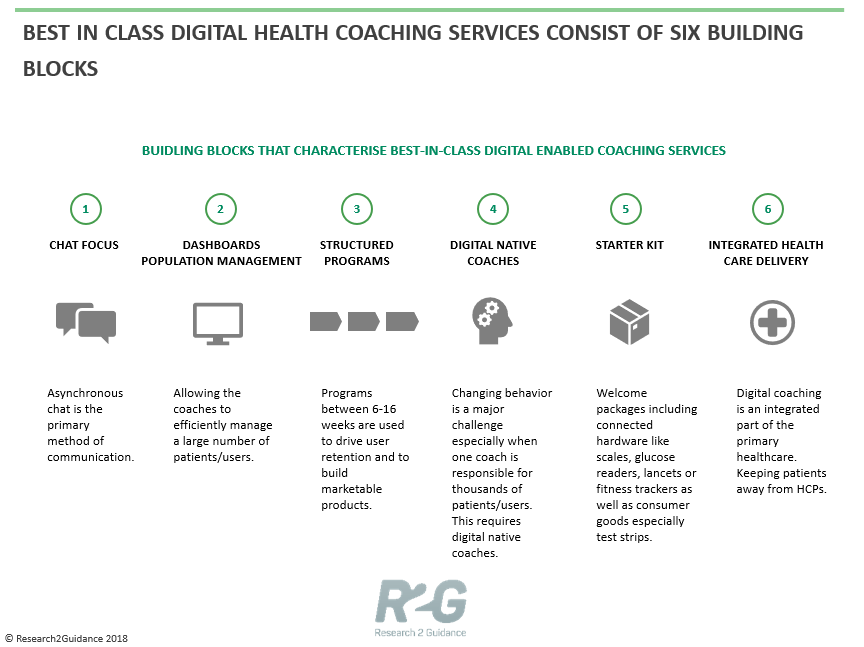
Majority of mHealth app solutions are still operating outside the traditional healthcare market. App supported coaching services are more and more seen as the missing bridge between digital health startups and healthcare incumbents. Coaching services are a win/win for both sides. Best in class app supported coaching services are built around 6 success factors.
App based coaching services are being offered by medical condition management apps that concentrate on a certain condition as opposed to broad telehealth services. Currently, the most served conditions are diabetes and obesity (see also Diabetes App Market Report 2016-2021). They started by providing self- management support for the user/patients and now are venturing into coaching services. Best in class app based coaching services are being developed around six success factors.
1. Chat focus: Chat is the main communication method for coaching, offering best quality and business KPIs as coach/patient ratios are highest among communication methods (up to 1:3,500). This might change in the near future as pure AI based coaching services (provided by companies like Lark, Nutrino) offer better ratios but current quality of pure AI coaching is lacking too far behind human coaching.
2. Sophisticated dashboards and population management tools: Allowing the coaches to efficiently manage a large number of patients/users is a must have. Best in class dashboards include group messaging, alerts, patient/user life cycle management as well as comprehensive reporting features. Companies like Oviva are more and more reaching dashboard standards from traditional hospital populations management systems while maintaining their advantages on the app side.
3. Structured programs: Programs between 6-16 weeks are used to drive user retention and to build marketable products. Medical app companies have largely failed to turn initial downloaders into long term active users. Best in class digital enabled coaching providers like OurPath, Noom, Omada are reacting with the introduction of short-term programs that aims to keep the user active over weeks but then let them go afterwards. These structured programs stimulate daily interaction with the user based on a standardized curriculum. In addition, companies like OneDrop have understood the value of structured programs for the productization of their coaching services.
4. Digital native coaches: Changing behavior is a major challenge especially when one coach is responsible for thousands of patients/users. This requires digital native coaches, which best in class digital enabled coaching providers have started to build up. They are dietitians, nutritionists, certified diabetes educators (CDE) or phsychologists willing and able to work remotely with their patients/users.
5. Starter Kit including connected devices and consumer goods: Best in class digital enabled coaching services include connected hardware like scales, glucose readers, lancets or fitness trackers into their starter kits and in the case of diabetes also consumer goods especially test strips as ongoing subscription service (e.g. Livongo, MySugr). Adding connected devices to the coaching offering increases user value and retention and supports new revenue streams.
6. Integrated health care delivery and business model: There are models that show how digital health enabled coaching became an integrated part of the patient treatment (Iora but also Humana, Caremore to name a few). In those models coaches become accountable for the health of the patients receiving a fixed budget (capitation) per patient. The coaches manage the “daily” communication with the patients identifying unhealthy habits and life styles, helping to change unhealthy behavior, setting and checking goals and monitoring risks. Pilots of integrated models have shown significant reductions in cost per patient mainly through reduced HCP and hospital visits.
Even though leading medical health apps have managed to gain a significant number of downloads, awareness in the press and for some even investment money, only a fraction of the 300,000 plus mHealth apps globally available have found partnership models with pharma, health insurance and med-tech companies.
In most cases both sides were not aware of the business drivers of the other side and basically how to talk to each other. This is currently changing and coaching as described above is best positioned to play a major role in this. The good thing about app based coaching services is that it is an understood and well known health service: telehealth. On top of it, coaching services are a win/win for both sides: appcos and healthcare companies especially payer organizations. So, what are their gains?
It is not an easy task to build up and grow an app based coaching service offering that is scalable and has a positive ROI but it could become a door opener for digital health start ups into the traditional health care market (especially payer market) in the next two years.
Ralf-Gordon Jahns. Ralf is the director of research2guidance, a specialized market research and consultancy company based in Berlin. Prior to research2guidance he was a partner and member of the leadership team of Capgemini Telecom Media & Networks.
